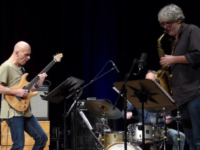Marc Copland has this welcoming, inward voice — cerebral but somehow completely accessible, in the way of the most enchanting records by Bill Evans from years back.
But as quiet as he can be, it seems that Copland never stops playing. “Alone” is actually the prolific pianist’s third album of 2009 — following the finale of his New York Trio Recordings trilogy (“Vol. 3: Night Whispers”), and “Insight,” a darkly effective duet with the bassist Gary Peacock.
Yet Copland doesn’t come close to running out of ideas on “Alone,” a terrific release from Munich-based Pirouet that has the introverted eloquence of a winter’s morning, and the soaring wonder of the biting blue sky above. Even after living with this music for a few weeks, it still gives me shivers.
 There are jazz tunes to be explored on this, Copland’s first solo-piano record since the well-received “Time Within Time” back in 2005 — notably a soul-lifting, textured take on Mal Waldron’s “Soul Eyes,” which opens “Alone”; as well as Wayne Shorter’s “Fall” and Sammy Cahn’s “I Should Care.”
There are jazz tunes to be explored on this, Copland’s first solo-piano record since the well-received “Time Within Time” back in 2005 — notably a soul-lifting, textured take on Mal Waldron’s “Soul Eyes,” which opens “Alone”; as well as Wayne Shorter’s “Fall” and Sammy Cahn’s “I Should Care.”
Copland sprinkles in some memorable originals, too, including an 11-minute meditation on “Night Whispers”; “Blackboard,” which sounds like a smile; and the gorgeous “Into the Silence.”
But, elsewhere, rather than sticking with a tried, and still admittedly true, formula of standards, Copland bravely tackles more contemporary works by Joni Mitchell — and relatively obscure ones, at that: “Michael from the Mountain,” from 1968’s “Song to a Seagull”; “I Don’t Know Where I Stand,” from 1969’s “Clouds”; and “Rainy Night House,” from 1970’s “Ladies of the Canyon.”
He turns the tunes over, seeking a new path, joyously reminiscent of the best stuff by Keith Jarrett or Ahmad Jamal. Copland then takes control of the melody, and makes it his own.
The result is a delicate and satisfying reharmonization, full of these subtle suspensions and drifting revelations — no surprise, perhaps, coming from a musician who began his career in the 1960s on the saxophone. Poetic and off-kilter, like a child’s embrace, Copland’s Mitchell remakes are the heart of what makes “Alone” such an atmospheric, yet suspensefully inventive experience.
He’s never sounded better, never connected more completely in the stillness of a listener’s heart. Copland is a pianist you’ll enjoy being “Alone” with.
- How Deep Cuts on ‘Music From Big Pink’ Underscore the Band’s Triumph - July 31, 2023
- How ‘Islands’ Signaled the Sad End of the Band’s Five-Man Edition - March 15, 2022
- The Band’s ‘Christmas Must Be Tonight’ Remains an Unjustly Overlooked Holiday Classic - December 25, 2016





